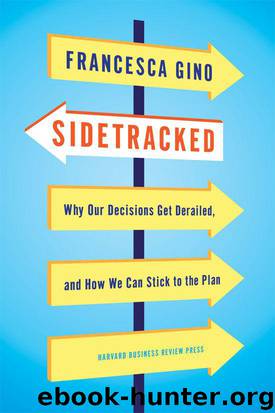Sidetracked: Why Our Decisions Get Derailed, and How We Can Stick to the Plan by Francesca Gino

Author:Francesca Gino [Gino, Francesca]
Language: eng
Format: mobi, epub
ISBN: 9781422142691
Publisher: Harvard Business Review Press
Published: 2013-02-11T14:00:00+00:00
Here is how the concept of social comparison applied to my own behavior regarding the gym initiative. Imagine that you are about to get a star-shaped sticker from your exercise instructor. At this point, your logbook has only three stickers. But you have seen the logbooks of your friends, and most of them have many more stars. How would you feel? I am not sure about you, but I was in this situation, and I was embarrassed by my poor performance up to that point and also motivated to work harder. (In my defense, I had signed up for the program two weeks late.) For a while, in fact, I even attended extra classes behind my friends’ backs so that I could earn the stars I was missing to be on par with them.
My reaction to my friends’ logbooks was consistent with research I have conducted on the influence of social comparisons on individuals’ motivation and productivity. In virtually any organization, managers face the task of ensuring that their employees are motivated and devote consistent effort to their jobs. One tool for keeping employees engaged, particularly with jobs that involve repetition of tasks over time, is to provide them with performance feedback that gives them information about the effectiveness of their work behavior.
Brad Staats and I conducted a field experiment to examine how giving employees performance feedback would affect their productivity. The empirical setting for our field experiment was the processing operation for APLUS, the consumer finance subsidiary of Shinsei Bank, a midsized bank based in Japan. At the time of our study, APLUS offered credit cards, credit for large purchases, and car loans to Japanese consumers. Employees working at APLUS sat at individual desktop computers and entered data from loan applications. They completed the same set of tasks repetitively throughout the course of the day, and their individual performance was precisely tracked by the company’s advanced information technology system. This seemed a perfect context for us to conduct our field experiment. Traditionally, APLUS employees did not receive performance feedback, and their pay did not vary based on their productivity. With our field experiment, we introduced variations on the type of feedback APLUS employees received on a daily basis for an entire month. In this way, we could examine the effects this feedback had on their individual productivity in a controlled manner.
We suspected that, as in the case of the star-shaped feedback I received for going to the gym, employees would respond differently to performance feedback depending on the comparisons they made between themselves and their coworkers regarding their productivity. We used feedback that promoted social comparison processes: workers learned about their performance standing relative to that of coworkers. We believed that this type of feedback captured common business practices. Although employees prefer to evaluate themselves and their standing using objective standards, such standards are rarely available in organizational settings. So, to assess how they are performing, employees compare themselves to their coworkers.
Brad and I designed various conditions for our field experiment, one of which is particularly relevant to our discussion here.
Download
Sidetracked: Why Our Decisions Get Derailed, and How We Can Stick to the Plan by Francesca Gino.epub
This site does not store any files on its server. We only index and link to content provided by other sites. Please contact the content providers to delete copyright contents if any and email us, we'll remove relevant links or contents immediately.
Goodbye, Things by Fumio Sasaki(8575)
The Road Less Traveled by M. Scott Peck(7593)
Daring Greatly by Brene Brown(6501)
Big Magic: Creative Living Beyond Fear by Elizabeth Gilbert(5754)
Grit by Angela Duckworth(5604)
Ego Is the Enemy by Ryan Holiday(5413)
Discipline Equals Freedom by Jocko Willink(5378)
The Laws of Human Nature by Robert Greene(5171)
The Wisdom of Sundays by Oprah Winfrey(5153)
You Are a Badass at Making Money by Jen Sincero(4922)
Influence: The Psychology of Persuasion by Robert B. Cialdini(4775)
The Miracle Morning by Hal Elrod(4711)
Rising Strong by Brene Brown(4449)
Reflections Of A Man by Mr. Amari Soul(4288)
A Simplified Life by Emily Ley(4156)
The Power of Positive Thinking by Norman Vincent Peale(4060)
Seriously... I'm Kidding by Ellen DeGeneres(3627)
How to Win Friends and Influence People in the Digital Age by Dale Carnegie & Associates(3547)
The Courage to Be Disliked by Ichiro Kishimi & Fumitake Koga(3488)
